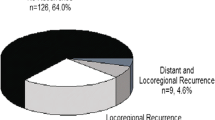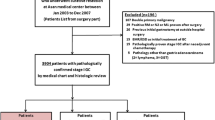Abstract
Background
A recent Intergroup trial demonstrated a significant survival advantage of postgastrectomy chemoradiation in gastric cancer patients, primarily because of a reduction of a relative locoregional recurrence (LRR) rate exceeding 70% in control patients. Radical gastrectomy with extended lymphadenectomy may reduce LRR, possibly affecting adjuvant treatment strategies.
Methods
Information on patients undergoing gastrectomy for potentially curable gastric cancer between 1990 and 2000 was reviewed. Patterns of first disease recurrence, survival, and disease-free survival were calculated, and predictors were identified.
Results
Gastrectomies were performed in 73 patients, with R0 resections in 82%. The median lymph node count was 24; positive nodes were found in 64% of patients. The median actuarial survival was 27 months, with a 5-year survival of 37%. Disease recurred in 35 patients (48%) after a median interval of 7 months (range, .5–67). Recurrent disease patterns included distant only (37%) peritoneal only (23%), peritoneal/locoregional (17%), all sites combined (14%), locoregional only (6%), and distant/locoregional (3%). Recurrence predictors were N3 category for distant recurrence (hazard ratio [RH], 10.2;P=.005), T3/4 category for peritoneal recurrence (HR, 4.8;P=.008), peritoneal relapse (HR, 40;P=.002), and a prior abdominal operation for LRR (HR, 3.2;P=.01). N2 disease had a distant failure risk similar to N1 status and an intraperitoneal failure risk similar to an N3 category.
Conclusions
Isolated LRR of gastric cancer after gastrectomy and extended lymphadenectomy is rare in this series. Most recurrences appeared diffusely at distant or peritoneal sites, and most LRRs occurred in conjunction with relapse at extraregional sites. Pathologic predictors of intraperitoneal (T3/4) or systemic failure (>N1) could be used to guide individualized, risk-oriented, adjuvant treatment.
Similar content being viewed by others
References
Macdonald JS, Smalley SR, Benedetti J, et al. Chemoradiotherapy after surgery compared with surgery alone for adenocarcinoma of the stomach or gastroesophageal junction.N Engl J Med 2001; 345:725–30.
Estes NC, MacDonald JS, Touijer K, Benedetti J, Jacobson J. Inadequate documentation and resection for gastric cancer in the United States: a preliminary report.Am Surg 1998;64:680–5.
Wanebo HJ, Kennedy BJ, Chmiel J, Steele G Jr, Winchester D, Osteen R. Cancer of the stomach. A patient care study by the American College of Surgeons.Ann Surg 1993;218:583–92.
Hundahl SA, Menck HR, Mansour EG, Winchester DP. The National Cancer Data Base report on gastric carcinoma.Cancer 1997;80:2333–41.
Bonenkamp JJ, Hermans J, Sasako, M, van de Velde CJ. Extended lymph-node dissection for gastric cancer. Dutch Gastric Cancer Group.N Engl J Med 1999;340:908–14.
Cuschieri A, Weeden S, Fielding J, et al. Patient survival after D1 and D2 resections for gastric cancer: long-term results of the MRC randomized surgical trial. Surgical Co-operative Group.Br J Cancer 1999;79:1522–30.
Fleming ID, Cooper JS, Henson DE, et al.,American Joint Committee on Cancer Staging Manual. 5th ed. Philadelphia: Lippincott-Raven, 1997.
Brady MS, Rogatko A, Dent LL, Shiu MH. Effect of splenectomy on morbidity and survival following curative gastrectomy for carcinoma.Arch Surg 1991;126:359–64.
Sasako M. Risk factors for surgical treatment in the Dutch Gastric Cancer Trial.Br J Surg 1997;84:1567–71.
Schwarz RE, Karpeh MS, Brennan MF. Surgical management of gastric cancer: the Western experience. In: Daly JM, Hennessy TPJ, Reynolds JV, eds.Management of Upper Gastrointestinal Cancer. London: WB Saunders, 1999:83–106.
Smith JW, Shiu MH, Kelsey L, Brenman MF. Morbidity of radical lymphadenectomy in the curative resection of gastric carcinoma.Arch Surg 1991;126:1469–73.
Degiuli M, Sasako M, Ponti A, Soldati T, Danese F, Calvo F. Morbidity and mortality after D2 gastrectomy for gastric cancer: results of the Italian Gastric Cancer Study Group prospective multicenter surgical study.J Clin Oncol 1998;16:1490–3.
Siewert JR, Bottcher K, Stein HJ, Roder JD. Relevant prognostic factors in gastric cancer: ten-year results of the German Gastric Cancer Study.Ann Surg 1998;228:449–61.
Siewert JR, Kestlmeier R, Busch R, et al. Benefits of D2 lymph node dissection for patients with gastric cancer and pN0 and pN1 lymph node metastases.Br J Surg 1996;83:1144–7.
Roder JD, Bottcher K, Siewert JR, Busch R, Hermanek P, Meyer HJ. Prognostic factors in gastric carcinoma. Results of the German Gastric Carcinoma Study 1992.Cancer 1993;72:2089–97.
Brennan MF, Karpeh M Jr. Surgery for gastric cancer: the American view.Semin Oncol 1996;23:352–9.
Macdonald JS, Smalley S, Benedetti J, et al. Postoperative combined radiation and chemotherapy improves disease-free survival and overall survival in resected adenocarcinoma of the stomach and GE junction. Results of Intergroup Study INT-0116 (SWOG 9008) (abstract).Proc Am Soc Clin Oncol 2000;19:1a.
Maehara Y, Hasuda S, Koga T, Tokunaga E, Kakeji Y, Sugimachi K. Postoperative outcome and sites of recurrence in patients following curative resection of gastric cancer.Br J Surg 2000;87: 353–7.
Yoo CH, Noh SH, Shin DW, Choi SH, Min JS. Recurrence following curative resection for gastric carcinoma.Br J Surg 2000;87:236–42.
Roukos DH, Lorenz M, Karakostas K, Paraschou P, Batsis C, Kappas AM. Pathological serosa and node-based classification accurately predicts gastric cancer recurrence risk and outcome, and determines potential and limitation of a Japanese-style extensive surgery for Western patients: a prospective with quality control 10-year follow-up study.Br J Cancer 2001;84:1602–9.
Hayes N, Ng EK, Raimes SA, et al. Total gastrectomy with extended lymphadenectomy for “curable” stomach cancer: experience in a non-Japanese Asian center.J Am Coll Surg 1999;188: 27–32.
Ribeiro U, Gama-Rodrigues JJ, Safatle-Ribeiro AV, et al. Prognostic significance of intraperitoneal free cancer cells obtained by laparoscopic peritoneal lavage in patients with gastric cancer.J Gastrointest Surg 1998;2:244–9.
Mori N, Oka M, Hazama S, et al. Detection of telomerase activity in peritoneal lavage fluid from patients with gastric cancer using immunomagnetic beads.Br J Cancer 2000;83:1026–32.
Averbach AM, Jacquet, P. Strategies to decrease the incidence of intra-abdominal recurrence in resectable gastric cancer.Br J Surg 1996;83:726–33.
Burke EC, Karpeh M Jr, Conlon KC, Brennan MF. Peritoneal lavage cytology in gastric cancer: an independent predictor of outcome.Ann Surg Oncol 1998;5:411–5.
Hirose K, Katayama K, Iida A, et al. Efficacy of continuous hyperthermic peritoneal perfusion for the prophylaxis and treatment of peritoneal metastasis of advanced gastric cancer: evaluation by multivariate regression analysis.Oncology 1999;57:106–14.
Estape J, Grau JJ, Lcobendas F, et al. Mitomycin C as an adjuvant treatment to resected gastric cancer. A 10-year follow-up.Ann Surg 1991;213:219–21.
Neri B, Cini G, Andreoli F, et al. Randomized trial of adjuvant chemotherapy versus control after curative resection for gastric cancer: 5-year follow-up.Br J Cancer 2001;84:878–80.
Chan WH, Wong WK, Khin LW, Chan HS, Soo KC, Significance of a positive oesophageal margin in stomach cancer.Aust N Z J Surg 2000;70:700–3.
Kim SH, Karpeh MS, Klimstra DS, Leung D, Brennan MF. Effect of microscopic resection line disease on gastric cancer survival.J Gastrointest Surg 1999;3:24–33.
Gunderson LL, Burch PA, Donohue JH. The role of irradiation as a component of combined modality treatment for gastric cancer.J Infus Chemother 1995;5:117–24.
Zhang ZX, Gu XZ, Yin WB, Huang GJ, Zhang DW, Zhang RG. Randomized clinical trial on the combination of preoperative irradiation and surgery in the treatment of adenocarcinoma of gastric cardia (AGC)—report on 370 patients.Int J Radiat Oncol Biol Phys 1998;42:929–34.
Schwarz RE. Postoperative adjuvant chemoradiation therapy for patients with resected gastric cancer: intergroup 116.J Clin Oncol 2001;19:1879–80.
Author information
Authors and Affiliations
Corresponding author
Rights and permissions
About this article
Cite this article
Schwarz, R.E., Zagala-Nevarez, K. Recurrence patterns after radical gastrectomy for gastric cancer: Prognostic factors and implications for postoperative adjuvant therapy. Annals of Surgical Oncology 9, 394–400 (2002). https://doi.org/10.1007/BF02573875
Received:
Accepted:
Issue Date:
DOI: https://doi.org/10.1007/BF02573875




